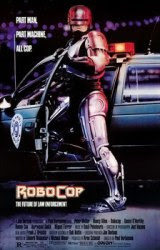 For the foul-mouthed, immature man-child, the obscenity and violence in RoboCop make it a masterpiece. For the rest of us, this dystopian future flick comes up a few rewrites short of a well-oiled machine.
For the foul-mouthed, immature man-child, the obscenity and violence in RoboCop make it a masterpiece. For the rest of us, this dystopian future flick comes up a few rewrites short of a well-oiled machine.In the not-too-distant future, the city of Detroit is a mess. Things are so bad and the city is so far in debt that it has sold its police forces to a private company, Omni Consumer Products. The firm, however, has plans to ransack and raze Detroit and replace it with a new utopian city. With the crime rate high, OCP develops a robotic law enforcer. The first demonstration fails miserably and a volunteer ends up brutally slain by the machine due to a malfunction. An ambitious developer in the firm uses the incident to greenlight his alternative project line, the RoboCop.
The RoboCop enforcer requires a human touch. In order for the RoboCop to function properly, a human brain is needed for some reason to maintain some kind of system balance. With cops getting killed all over Detroit, OCP has plenty of candidates to choose from.
Enter officer Alex Murphy, a determined cop who values justice and service to the city. While making a surprise raid on a dangerous gang, Murphy is captured and tortuously executed by the thugs and their boss Boddicker (Kurtwood Smith- aka Topher Grace’s dad on That 70’s Show). When brought to the hospital morgue though, Murphy is used as the first active host for RoboCop.
With a simple set of directives in his memory banks, RoboCop does a smash-up job fighting crime in the city. He’s virtually bulletproof, a wicked shot and has amazing strength. Then his human brain begins injecting memories from Murphy’s life into his mind. RoboCop struggles with seeing images and nearly remembering the wife and family he used to have and also has flashes of the goons who killed him.
At this point, the film heads in the wrong direction. Instead of RoboCop seeking an identity for himself aside from the steel and wires of his makeup, he instead makes it his personal mission to hunt down and eliminate Boddicker and his minions. RoboCop hits a few snags along the way as Boddicker is secretly working for OCP by raising crime rates to drive people out of Detroit, thereby bringing OCP’s dream of rebuilding the city all the more closer to fruition. But of course, RoboCop rises above the corporate corruption and upholds the law, seemingly bringing an end to all the bad guys.
After looking into the history of the conception and development of RoboCop, I understand that the filmmakers were looking to include heavy doses of dark cultural satire, but the problem with making fun of the culture of your time is that it rarely ever translates well for future generations. Twenty-one years after its release, RoboCop fails to resonate on a cultural level.
In the past, many books and movies had been made about dystopian societies growing out of extreme liberal social policies so I guess RoboCop is the other end of the spectrum. The 1980’s saw the rise of powerful corporations and there were plenty of people in Hollywood that hated it. Ultra-liberal leaning writers and producers were looking for a way to make a statement against what they saw was a conglomorative threat to their liberal ideals. They found it (or they thought they had) in RoboCop. It’s a violent movie that will appeal to young males and supply a subtle dose of anti-corporate subtext.
The filmmakers also include bizarre and random segments of news shows for that dystopian future. These segments fill in gaps while RoboCop is being programmed and between a few major plot segments. They were designed to show even further evidence of the dangers that selfish capitalistic policies pose to civilization if let run rampant, but it all comes across as dated and hokey. There was simply too much time and effort put into refining these anti-corporate extras and not enough time developing a compelling story.
This brings us to the film’s substance. At one point, RoboCop’s memories of Murphy’s family become so frequent it seems as if he’ll try to find them and reconcile with his loved ones and himself about the machine he has become. But, instead of taking an introspective angle, the film becomes a revenge piece. RoboCop goes after the bad guy, which almost makes him a tool really. Sure, in the end his sense of honor and duty help him put a stop to his developers' nefarious plans, but is that really enough of a message?
I don’t think so. Sure, it shows that duty and honor can overcome the most intimate of villains, even those posing as your friends, but that message has been delivered so many times in movies that it’s a cliché. Besides, there was no real conflict for RoboCop to bring down his creators. His programming tried to stop him, but there was no ethical or moral dilemma present.
That’s the big problem- as hard as they may have tried, RoboCop is too far removed from his humanity to even affect us as viewers. They got close, but then shied away for a path that would keep the bloodthirsty adolescents happy. And bloodthirsty it is! Even RoboCop’s methods cross the line on police brutality by today’s standards. I don’t know if this was intended as part of the anti-cultural subtleties or not, but it was jarring nonetheless.
I liked some of the gritty filmmaking techniques that gave a better sense of realism and (in some cases) a quasi-indie feel, but RoboCop is nothing more than an underdeveloped guilty pleasure.
RATING: 2.75 out of 5
No comments:
Post a Comment